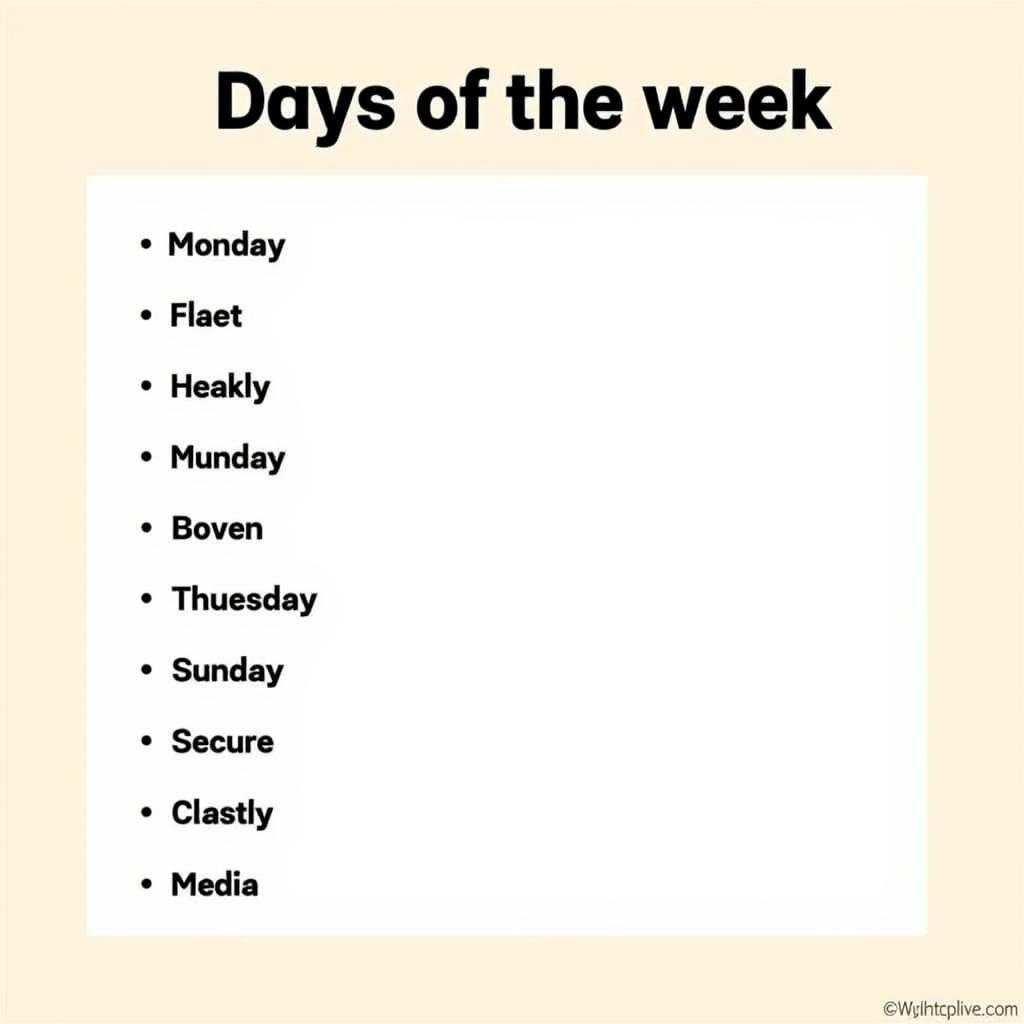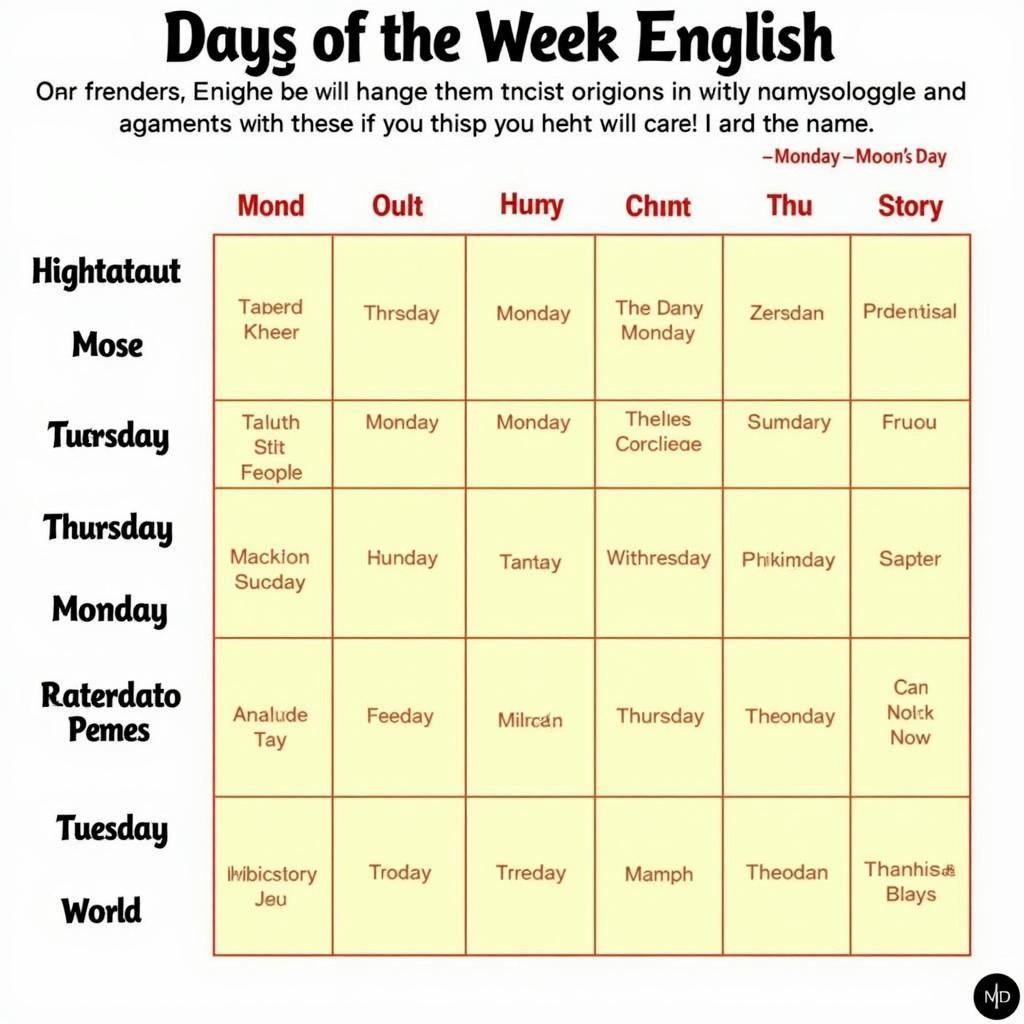Understanding the English days of the week is fundamental for anyone learning the language. “Lịch Tuần Tiếng Anh,” or English week calendar, is an essential tool for scheduling, planning, and navigating everyday life, especially in an international context. Whether you’re a student, professional, or traveler, knowing the days of the week in English is crucial for effective communication.
Why is “Lịch Tuần Tiếng Anh” Important?
Knowing the “lịch tuần tiếng Anh” is more than just memorizing vocabulary. It opens doors to understanding cultural nuances, scheduling appointments, and engaging in everyday conversations. Imagine trying to book a flight, arrange a meeting, or even understand a bus schedule without knowing the days of the week! It’s a basic building block for anyone interacting with English speakers or English-speaking environments.
 Basic English Week Calendar
Basic English Week Calendar
Breaking Down the “Lịch Tuần Tiếng Anh”
Here’s a detailed breakdown of each day, along with their origins and some interesting facts:
- Monday: The first day of the working week for many, Monday originates from “Moon’s day.” Often seen as a fresh start, it can also be associated with the “Monday blues.”
- Tuesday: Named after the Norse god Tyr, Tuesday is often a busy workday for most.
- Wednesday: Derived from “Woden’s day,” Wednesday is the mid-point of the week, often signifying that the weekend is within reach.
- Thursday: Thor’s day, named after the Norse god of thunder, Thursday is often associated with anticipation for the weekend.
- Friday: Frigg’s day, named after the Norse goddess of marriage and motherhood, Friday is often celebrated as the end of the working week.
- Saturday: Saturn’s day, named after the Roman god of agriculture, Saturday is a day for leisure and relaxation.
- Sunday: Sun’s day, Sunday is traditionally a day of rest and often associated with religious observance.
 Detailed English Week Calendar with Origins
Detailed English Week Calendar with Origins
How to Remember the “Lịch Tuần Tiếng Anh”
Learning the “lịch tuần tiếng Anh” can be easy and fun! Here are some tips:
- Songs and Rhymes: Many children’s songs and rhymes teach the days of the week in a memorable way.
- Flashcards: Create flashcards with the English day on one side and the Vietnamese equivalent on the other. This helps with visual recognition and memorization. You can visit điểm du lịch gần hà nội to unwind after a study session.
- Daily Practice: Incorporate the days of the week into your daily conversations. Try talking about your schedule or plans for the week in English. If you’re a movie buff, checking the lịch chiếu starlight can be a fun way to practice using the days of the week.
“Lịch Tuần Tiếng Anh” in Everyday Life
Understanding the “lịch tuần tiếng anh” is crucial for numerous everyday situations:
- Scheduling: From booking appointments to planning events, knowing the days of the week is essential.
- Travel: Navigating transportation schedules, making hotel reservations, and understanding tour itineraries all require familiarity with the days of the week.
- Work: Most workplaces operate on a weekly schedule, making knowledge of the “lịch tuần tiếng anh” vital for professional communication. You might even enjoy a relaxing trip to du lịch flamingo đại lải on your days off.
Conclusion: Making “Lịch Tuần Tiếng Anh” Part of Your Vocabulary
Mastering the “lịch tuần tiếng anh” is a crucial step in your English language journey. By incorporating these simple tips and practicing regularly, you’ll soon be confidently navigating schedules, making plans, and communicating effectively in English. Remember, knowing your “lịch tuần tiếng anh” opens doors to a wider world of communication and understanding. Want to know more about historical events and dates? Check out những di tích lịch sử nổi tiếng ở việt nam. Looking for a fun, easy job? See our article on lịch chiếu phim nghề siêu dễ.
Khi cần hỗ trợ hãy liên hệ Số Điện Thoại: 02033846556, Email: [email protected] Hoặc đến địa chỉ: 178 Ba Lan, Giếng Đáy, Hạ Long, Quảng Ninh, Việt Nam. Chúng tôi có đội ngũ chăm sóc khách hàng 24/7.

